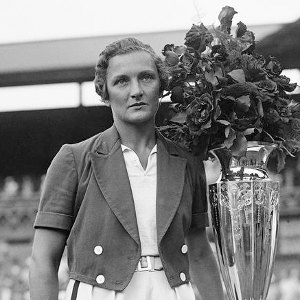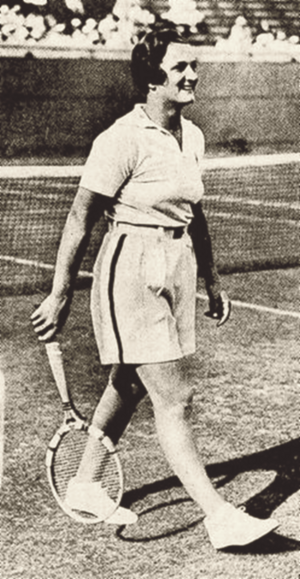Helen Jacobs facts for kids

Jacobs with the Wightman Cup, Wimbledon 1934
|
|
| Full name | Helen Hull Jacobs |
|---|---|
| Country (sports) | |
| Born | August 6, 1908 Globe, Arizona, U.S. |
| Died | June 2, 1997 (aged 88) East Hampton, New York, U.S. |
| Retired | 1947 |
| Int. Tennis HoF | 1962 (member page) |
| Singles | |
| Highest ranking | No. 1 (1936, A. Wallis Myers) |
| Grand Slam singles results | |
| French Open | F (1930, 1934) |
| Wimbledon | W (1936) |
| US Open | W (1932, 1933, 1934, 1935) |
| Doubles | |
| Grand Slam doubles results | |
| French Open | F (1934) |
| Wimbledon | F (1932, 1936, 1939) |
| US Open | W (1932, 1934, 1935) |
| Grand Slam mixed doubles results | |
| US Open | W (1934) |
| Team competitions | |
| Wightman Cup | (1927, 1929, 1931, 1932, 1933, 1934, 1935, 1936, 1937, 1939) |
Helen Hull Jacobs (born August 6, 1908 – died June 2, 1997) was an amazing American tennis player. She won nine major tennis titles, known as Grand Slam titles, during her career. In 1936, she was even ranked as the No. 1 female singles player in the world!
Contents
Early Life and Beginnings
Helen Jacobs was born in Globe, Arizona. Her family moved to San Francisco in 1914. She grew up in Berkeley, California, where she learned to play tennis at the Berkeley Tennis Club. She also went to the University of California, Berkeley. Helen was one of the most famous Jewish female tennis players of her time.
Tennis Career Highlights
Helen Jacobs was known for her strong serve and powerful overhead shots. She also had a great backhand. She won five Grand Slam singles titles. She also reached the finals eleven other times in singles tournaments. Six of those times, she played against her main rival, Helen Wills Moody.
Her only win against Helen Wills Moody happened in the 1933 U.S. Championships final. Moody had to stop playing because of a back injury. Later, Moody explained that her back problem made it impossible to continue.
In the 1935 Wimbledon final, Helen Jacobs almost beat Moody again. She had a chance to win the match, but a small mistake cost her the point and eventually the match. In the 1938 Wimbledon final, Helen Jacobs twisted her ankle early in the match. Even though she was hurt, she kept playing. She wanted Helen Wills Moody to feel like she had won a complete match.
Overall, Helen Jacobs played Helen Wills Moody 15 times in singles matches. She won one of those matches.
Helen also won three Grand Slam titles in women's doubles and one in mixed doubles. She was also a finalist in six women's doubles tournaments and one mixed doubles tournament. In 1934, she won both the singles and women's doubles titles at the Italian Championships.
From 1928 to 1939, Helen Jacobs was ranked among the top 10 tennis players in the world. In 1936, she reached her highest ranking as World No. 1. She was also the top-ranked U.S. player from 1932 to 1935.
Helen was a key member of the U.S. Wightman Cup team for many years, from 1927 to 1937, and again in 1939. The Wightman Cup was a team tennis competition between the United States and Great Britain.
In 1933, Helen Jacobs made history at Wimbledon. She was the first woman to wear shorts designed for men during a match. This was a big change from the traditional long skirts worn by female players at the time.
While still playing tennis, Helen also became a writer. She wrote books about tennis, like Modern Tennis (1933) and Improve Your Tennis (1936). She also wrote stories, including Storm Against the Wind (1944). Her own life story, Beyond the Game, came out in 1936. In 1949, she wrote Gallery of Champions, which was a book about other female tennis players.
Honors and Awards
Helen Jacobs received many awards for her tennis achievements. In 1933, she was named the Associated Press Female Athlete of the Year. She was welcomed into the International Tennis Hall of Fame in 1962.
Later Life
During World War II, Helen Jacobs served in the U.S. Navy. She worked in Navy intelligence and became a commander. She was one of only five women to reach that high rank in the Navy during the war.
Helen Jacobs passed away from heart failure in East Hampton, New York, on June 2, 1997.
Images for kids
See also
 In Spanish: Helen Hull Jacobs para niños
In Spanish: Helen Hull Jacobs para niños
- Performance timelines for all female tennis players who reached at least one Grand Slam final
- List of select Jewish tennis players
 | Kyle Baker |
 | Joseph Yoakum |
 | Laura Wheeler Waring |
 | Henry Ossawa Tanner |



